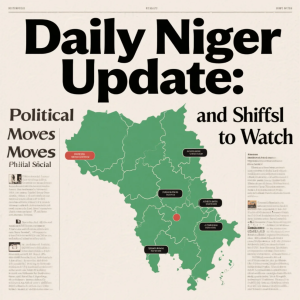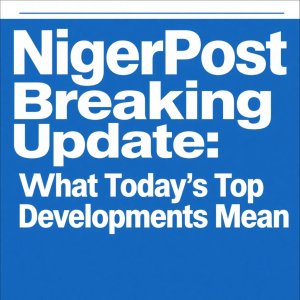Niger is more than headlines of coups and crises—it is a tapestry of lived experience. Real Voices Across Niger refers to stories of ordinary people facing extraordinary challenges: insecurity, exclusion, education gaps, and resilient community efforts. These field notes aim to shed light on the issues that aren’t always visible from abroad.
1. Community Radio: The Frontline of Local Journalism
In remote Nigerien regions, community radios serve as vital lifelines. Journalists like Fati Amadou Ali risk threats and instability just to deliver news, health advisories, and social updates to rural listeners. IFEX
They cover stories of local importance—gender equality, violence, literacy—often when national media cannot reach these areas. The courage shown by these voices shows how essential free information is to social cohesion. IFEX
2. Youth Marginalization and Unequal Opportunity
Among many issues, youth outside urban centers face significant barriers. Access to education is inconsistent; vocational training and civil society support tend to cluster in cities. In rural Niger, many children between ages 7–12 are out of school, or live under circumstances that force them into informal labor or begging. Voice.Global
Young people report being stigmatized, lacking trust, and often disconnected from political platforms intended to represent them. Voice.Global
3. Children Under Marabout Care: Safety, Education, and Rights
There’s a persistent concern over “talibé” children—young boys sent to live with Islamic instructors in hopes of religious education. While tradition plays a strong role, many of these children face neglect, exploitation, or lack of access to formal schooling. Voice.Global
Voices from those familiar with their situation call for oversight, better welfare, and inclusive education.
4. Civil Society, Advocacy, and Invisible Voices
Many grassroots groups are doing vital work—providing services, pushing for inclusion, and advocating for the rights of vulnerable populations. However, their reach is uneven. For example, civil society organizations often lack resources to support children with disabilities, marginalized youth, or remote communities. Voice.Global
There is also a gap in how these voices are heard in formal decision-making structures. Advocacy is growing, but there’s concern about closeness with government policy and whether that limits independence. Voice.Global
5. Insecurity, Press Freedom, and Information Access
Security threats—both from armed groups and sometimes from state restrictions—affect everyday life. Areas near borders or conflict zones see limited access to services, limited movement, and greater risk. Physicians, teachers, journalists often face obstacles delivering services. viceversaglobal.com+2IFEX+2
Press freedom and reporting are under pressure. Journalists working in rural or conflict-sensitive areas risk harassment, intimidation, or worse, yet they persist as many see them as essential voices for transparency and accountability. IFEX
🌱 Conclusion
These field notes—these tales of daily struggle, loss, resilience—point to a clear message: Niger’s challenges are many, but so is its courage. To hear real voices is to understand the lived reality behind the statistics, and to push for solutions that come from within.
For policymakers, NGOs, and international observers, these stories call for support that is grounded, local, and respectful of dignity. Only by listening can we help create lasting change.




